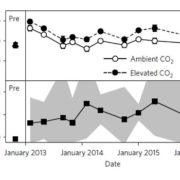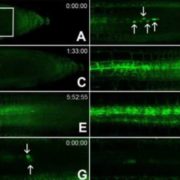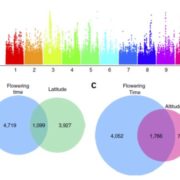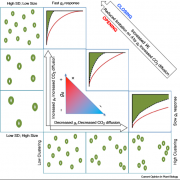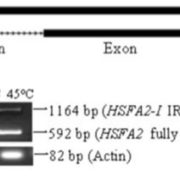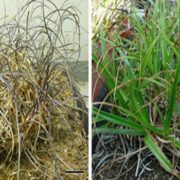Silencing phosphoenolpyruvate carboxylase phosphorylation in a CAM plant
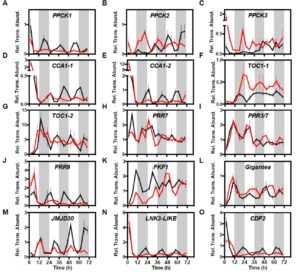 Many plants living in arid environments conserve water by taking up CO2 at night through the action of the enzyme phosphoenolpyruvate carboxylase (PPC); this process, which is widespread in the Crassulaceae family, is known as Crassulacean acid metabolism (CAM). The nocturnal activity of PPC is regulated post-transcriptionally through its phosphorylation by PPC kinase (PPCK). Boxall et al. investigated the effect of using RNA interference to decrease expression of PPCK in the CAM plant Kalanchoë fedtschenkoi. As expected, they found that the PPCK knock-down plants showed less CO2 fixation in the dark and greater sensitivity to drought. They also found that several genes encoding components of the circadian clock lost their circadian periodicity in the knock-down mutants, suggesting that, “perturbing the only known link between CAM and the circadian clock feeds back to perturb the central circadian clock itself.” Plant Cell 10.1105/tpc.17.00301
Many plants living in arid environments conserve water by taking up CO2 at night through the action of the enzyme phosphoenolpyruvate carboxylase (PPC); this process, which is widespread in the Crassulaceae family, is known as Crassulacean acid metabolism (CAM). The nocturnal activity of PPC is regulated post-transcriptionally through its phosphorylation by PPC kinase (PPCK). Boxall et al. investigated the effect of using RNA interference to decrease expression of PPCK in the CAM plant Kalanchoë fedtschenkoi. As expected, they found that the PPCK knock-down plants showed less CO2 fixation in the dark and greater sensitivity to drought. They also found that several genes encoding components of the circadian clock lost their circadian periodicity in the knock-down mutants, suggesting that, “perturbing the only known link between CAM and the circadian clock feeds back to perturb the central circadian clock itself.” Plant Cell 10.1105/tpc.17.00301


